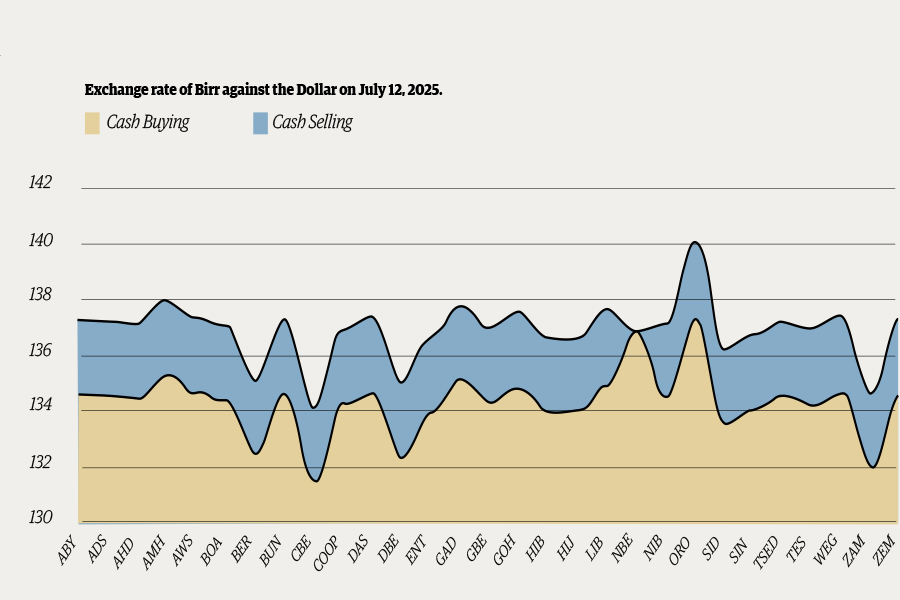
Close to 50 private higher education institutions have been found to register beyond their capacity, following the end of a one-month notice given by the Federal Education & Training Authority to report the number of students enrolled in each program. The Authority suspended the accreditation of over 1,000 courses and permits to new institutions indefinitely, effective December 2022.
Officials at the Authority told Fortune that almost all institutions that had submitted a report within the month were over-capacitated.
Formerly known as the Higher Education Relevance & Quality Agency, the Authority was mandated to supervise and has made the decision after surveying institutions with aims to curb the rising numbers of forged and invalid documents.
Students are not aware of the invalidity of their degrees until they seek authentication from the Authority following promotions or application to job posts, noted Wubshet Tadele, deputy director at the Authority.
"The profit-oriented approach rather than the quality of education led to this," he said.
Wubshet emphasised that the evaluation would continue in more than 40 public universities.
Atlas Health Science College offers dental medicine courses from undergraduate to level four programs, with 600 students currently enrolled. The College sent the list of their students to the Authorities last week.
According to General Manager Mohammed Nurhussien, the high entry exam results requirements, coupled with security issues have made private institutions the preferred choice. However, he said the quota limitation set by the Authority that did not take the specific capacity and infrastructure of institutions into consideration had led his institution to operate below capacity.
Since Berhanu Nega took the Ministry of Education, a stringent Exit and Entrance examination process was introduced where 152,014 students scored points to join public universities out of nearly 600,000 students in the past year.
Officials at the Authority have been preparing new standards to replace the former supervision system four months ago, intending to identify the operational institutions and the exact number of their students, according to Cherugeta Genene, inspection, and authentication deputy head.
He said the public should be aware of fraud in private institutions and check the accreditation and duration of the renewal and the allowed method of providing the programmes to their students, such as online, distance, or regular.
In the past year, around 120 private colleges failed to renew accreditation for at least one programme, while others have been found enrolling students in unaccredited courses or moving campuses without informing the Authorities.
Established in 2002, Rift Valley University is a private institution with 48 campuses with four to seven departments. Asfaw Kudama, alumni and registrar directorate head at the University, said they place students in other departments when exceeding the limit.
The managers faced difficulty submitting the required information early from all branches but made it to the deadline. According to Asfaw, the new directive should be implemented from the day of approval as it has caused inconvenience to previous graduates.
According to him, the authorities refuse to validate those who do not have the same academic advancement.
For Tirusew Teferra (Prof.), who has been a lecturer at Addis Abeba University, establishing institutions based on one or few individuals with good profiles catches the attention of many leading to the enrolment of students beyond institutional capacity.
According to Tirusew, the problem is not addressed by short notice and ordinances and should be discussed between the institutions and the officials at the Authority. He believes that the reports saved in a database can identify students looking for document authentication recommending the Authority design a better control mechanism.
PUBLISHED ON
[ VOL
, NO
]

Fortune News | Mar 02,2019

Agenda | Apr 28,2024

Fortune News | Sep 24,2022

Fortune News | Aug 08,2020

Radar | Jul 27,2025

Radar | Jan 04,2020

Radar | Mar 26,2022

Money Market Watch | Jul 13,2025

Sunday with Eden | Jan 12,2019

Fortune News | Jan 30,2021

Dec 22 , 2024 . By TIZITA SHEWAFERAW
Charged with transforming colossal state-owned enterprises into modern and competitiv...

Aug 18 , 2024 . By AKSAH ITALO
Although predictable Yonas Zerihun's job in the ride-hailing service is not immune to...

Jul 28 , 2024 . By TIZITA SHEWAFERAW
Unhabitual, perhaps too many, Samuel Gebreyohannes, 38, used to occasionally enjoy a couple of beers at breakfast. However, he recently swit...

Jul 13 , 2024 . By AKSAH ITALO
Investors who rely on tractors, trucks, and field vehicles for commuting, transporting commodities, and f...

Oct 25 , 2025
The regulatory machinery is on overdrive. In only two years, no fewer than 35 new pro...

Oct 18 , 2025
The political establishment, notably the ruling party and its top brass, has become p...

Oct 11 , 2025
Ladislas Farago, a roving Associated Press (AP) correspondent, arrived in Ethiopia in...

Oct 4 , 2025
Eyob Tekalegn (PhD) had been in the Governor's chair for only weeks when, on Septembe...